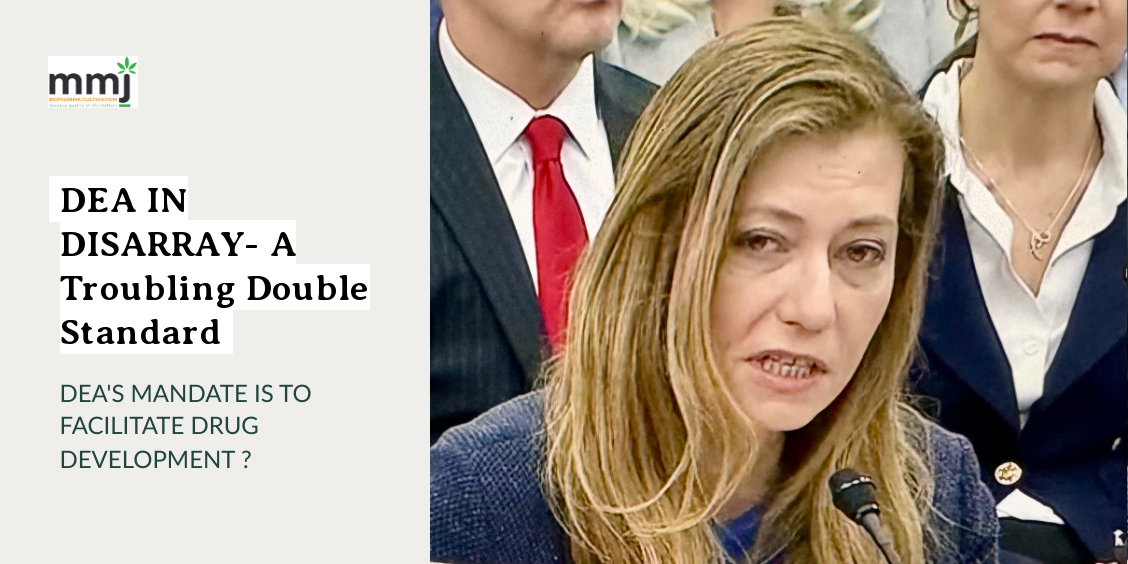
Marijuana Rescheduling Process Normally Steered by the DEA had been taken over by the U.S. Justice Department. The decision would not be signed by DEA ANNE MILGRAM but by Attorney General Merrick Garland.
WASHINGTON, DC / ACCESSWIRE / May 23, 2024 / During a recent congressional hearing, Anne Milgram , Director of the Drug Enforcement Administration (DEA), passionately addressed the alarming surge in illegal fentanyl-related deaths . Her plea for action against this epidemic resonated widely. However, amidst this urgency, a significant contradiction emerges- the DEA's hindrance of marijuana research and drug development.

DEA vs. Marijuana Research: A Troubling Double Standard
Despite the Biden administration's move to reschedule marijuana from Schedule I to Schedule III under the Controlled Substances Act (CSA), which was hailed as "monumental," the DEA's stance on cannabis remains a point of contention. MMJ BioPharma Cultivation, which aims to grow pharmaceutical marijuana for FDA-sanctioned trials treating conditions like Multiple Sclerosis (MS) and Huntington's Disease (HD), has faced significant obstruction from the DEA.
Further investigation reveals that several additional pharmaceutical companies are challenging the DEA, Director Milgram, and other officials over the constitutionality of the agency's administrative processes . Four separate actions in four different federal court districts suggest the DEA has an administrative problem at its core.
Constitutional and Regulatory Conflicts
Failure to Comply with Presidential and Congressional Mandates: The DEA's manner of appointing Administrative Law Judges has led to constitutional rights violations for affected pharmaceutical companies.
Refusal to Ease Research Regulations: Despite growing evidence of marijuana and psychedelics' efficacy in treating MS, HD, and chronic pain, the DEA's stringent policies continue to hamper progress in these areas.
Implications for Medical Cannabis
The DEA's staunch opposition to marijuana research has impeded large-scale clinical trials and drug development by companies like MMJ BioPharma, depriving patients of potentially life-changing treatments. This opposition starkly contrasts with Director Milgram's urgent call for action against the fentanyl crisis, highlighting a troubling double standard within the agency.
DOJ Steps In
In a secluded meeting at the DEA headquarters, Director Milgram revealed that the process of reclassifying marijuana, normally managed by the DEA, had been taken over by the U.S. Justice Department. Attorney General Merrick Garland, not Milgram, would sign the reclassification action. This unprecedented move underscores internal tensions and the Justice Department's pushback against the DEA's restrictive criteria for marijuana research.
MMJ BioPharma Cultivation's Legal Battle
On April 10, 2024, MMJ BioPharma Cultivation filed a lawsuit against Anne Milgram, Attorney General Garland, and several DEA personnel. The suit challenges the DEA's unexplained and unanswered delays in facilitating marijuana research, arguing that the DEA's actions deny suffering patients potential relief.
Industry and Congressional Outcry
Industry leaders and lawmakers have voiced their frustrations with the DEA. MMJ BioPharma's President, Duane Boise, criticized the DEA for failing its legislative mandate, while CEO Dr. Elio Mariani emphasized the company's determination to uncover the truth behind the DEA's inaction . Congressman Buddy Carter recently labeled the DEA the "EPITOME OF INEPTITUDE," questioning the agency's competence and motives.
Conclusion: The Need for Answers
The DEA's contradictory stance on addressing the fentanyl crisis while obstructing marijuana research raises critical questions. Is the DEA acting intentionally? Does it have a hidden agenda? Are its personnel incompetent? Millions of Americans depend on the DEA for their well-being, and they deserve clear, transparent answers to these pressing questions.
Is the DEA acting intentionally? Does the DEA have a hidden agenda? Is the DEA personnel incompetent or all of the above?
MMJ is represented by Attorney Megan Sheehan of Rhode Island.
CONTACT :
Madison Hisey
mhisey@mmjih.com
203-231-8583
SOURCE: MMJ BioPharma Cultivation
View the original press release on accesswire.com
